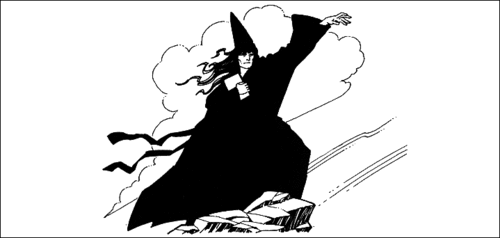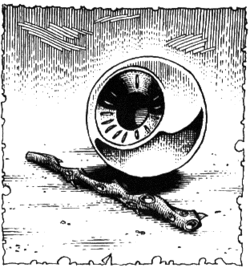Pagan magic
Magic in Pagan works differently than in Britannia. It is based on the elemental philosophy of the Pagans' beliefs. Here it is divided into five different schools, each with its own rules, spells, reagents and properties. This article gives a deeper insight into the mechanics of magic on this world.
The Five Schools of Magic[edit]
For a list of all spells, see Pagan spells.
Necromancy[edit]
- Main article: Necromancy
Necromancy is the magic of Earth and the Titan Lithos, and deals with spells of the dead.[1]
Tempestry[edit]
- Main article: Tempestry
Tempestry is the magic of Water and the Titan Hydros, and is based on water and weather effects.[2]
Theurgy[edit]
- Main article: Theurgy
Theurgy is the magic of Air and the Titan Stratos, and is loosely based on air and healing.[2]
Sorcery[edit]
- Main article: Sorcery
Sorcery is the magic of Fire and the Titan Pyros, and its spells are almost all dedicated to destruction.[3]
Thaumaturgy[edit]
- Main article: Thaumaturgy
Thaumaturgy is the the magic of the Ether itself. Its spells were derived entirely by Mythran from the other schools of magic.[4]
Reagents[edit]
Three of the schools of magic in Pagan need to use reagents to access their magic. These are Necromancy, Sorcery and Thaumaturgy. The first two only use the reagents of their own school, while the third uses all types of reagents, and adds some of its own.[5]
The Reagents of Necromancy[edit]
(Note: These reagents can be found in the Catacombs, Carthax Lake and Stone Cove.)
| Name | Use of the Reagent | |
|---|---|---|
| Executioner's hood | The fungus is black in hue, dark in purpose and shaped like the head-covering of its namesake.[6] | |
| Wood | Almost ageless, a time-aided tree can be stronger than the hardest rock.[6] | |
| Dirt | The plant grows from the womb of the land, its roots deeply embedded in the safety of soil.[6] | |
| Blackmoor | This is an odd mixture of the element of Earth and the mysterious Blackrock.[6] | |
| Bone | The source of blood is also, strangely enough, the source of the will, and remembers the life it once embraced.[6] | |
| Blood | The essence of life, reft from the body, serves as a reminder of mortality.[6] | |
| Dead man’s elbow | A special case; this is a reagent whose uses are unknown.[7] |
The Reagents of Sorcery[edit]
(Note: These reagents can only be found in the Daemon's Crag.)
| Name | Use of the Reagent | |
|---|---|---|
| Volcanic ash | The refuse of the volcano has the property of creating the initial spark of Fire.[8] | |
| Brimstone | This is the rock that burns or, more to the point in Sorcery, explodes. A virtually limitless source of power dwells within its etheric composition.[8] | |
| Daemon bones | Having taken a hint from the Necromancers, the Cabal found that Bone does, indeed, retain its tie to life. It is even useful in the ritual of binding when enough power is at hand. Daemonic forces are summoned and controlled by use of this reagent.[8] | |
| Pumice | This rock, cast highest and farthest from the volcano, retains the etheric impetus built up in the flight.[8] | |
| Obsidian | While seeming to be a fragile, easily broken substance, it endures the heat of the volcano.[8] | |
| Pig iron | Iron's hard yet versatile nature works in protective Sorcery as no other reagent can.[8] |
The Reagents of Thaumaturgy[edit]
(Note: only Mythran sells these reagents.)
| Name | Use of the Reagent | |
|---|---|---|
| Eye of newt | This aids the mage in focusing the inner eye within the mind.[9] | |
| Dragon blood | So powerful is this creature that the blood burns as if aflame. Precise measurements of this are wise, for too much and the magic will go dangerously awry.[9] | |
| Serpent scales | The poison in the mouth of this beast seeps into the flesh and corrupts the scales, giving them the magical ability to act as a destructor of bonds.[9] | |
| Bat wing | The flesh, bone, and blood found in this structure serves as an excellent lodestone to the essence of life.[9] |
Incantations[edit]
This section is about words that are used when casting a spell, sometimes called "Words of Power". For Words of Power that open dungeons in Ultima V, see Words of Power (dungeons).
- Main article: Incantation
As in Britannia and Serpent Isle, incantations have to be used to activate a spell. They are needed for every school, except Tempestry, and are therefore universal.
Lore[edit]
| “ | My years of research in the field of magic have led me to the conclusion that all magic is simply the manifestation of a being's will, superimposed upon reality, through the means of etheric emanations. Furthermore, I propose that such emanations are truly limited only by the imagination and willpower of the entity in question.
Certain rituals and words can assist the caster in visualizing the desired effect, just as certain physical objects can lend power, stability and shape to the caster's will. These props are not always necessary for beings of considerable power or intellect, but are useful for most spellcasters. Following is a detailed analysis of the styles of spellcrafting that I have been able to observe in this world — Necromancy, the rituals of death; Tempestry, the power of the Water and storms; Theurgy, the discipline of attuning the spirit; Sorcery, the craft of destruction; and what I call Thaumaturgy, my personal study of magic. – from The Chronicle of Pagan (Ultima VIII)
|
|---|
Trivia[edit]
Note that in order to use the spells, the Avatar first has to learn about them, in order to set the appropriate flags.
- For Necromancy, one has to read the books about the spells and Lothian’s scroll in the Cemetery, as well as learn the remaining ones from the Ancient Necromancers, in order to create and use them.
- For Theurgy, one has to read the books on Argentrock Isle in order to be in the know about the spells and which foci can be made from silver ore. The sole exception is Air Walk, as this is taught by Stratos.
- For Sorcery, the books in the library of Daemon's Crag and Malchir’s room have to be read in order to be able to create and use said spells.
- For Thaumaturgy, Mythran selling the spellbook is enough to use the spell – of course with the needed reagents.
References[edit]
- ↑ Lothian. THE MAGIC OF LOTHIAN (Ultima VIII – in-game).
- ↑ Jump up to: 2.0 2.1 Mythran. THE OBJECTIVE HISTORY OF PAGAN (Ultima VIII – in-game).
- ↑ Corodin of Argentrock. ON SORCEROUS WAYS... (Ultima VIII – in-game).
- ↑ Bentic. "A Treatise". THE CHRONICLE OF PAGAN (Ultima VIII).
- ↑ Bentic. "A Treatise". THE CHRONICLE OF PAGAN (Ultima VIII).
- ↑ Jump up to: 6.0 6.1 6.2 6.3 6.4 6.5 Bentic. "A Treatise". THE CHRONICLE OF PAGAN (Ultima VIII).
- ↑ Vividos. Paul Carr. Ultima VIII.
- ↑ Jump up to: 8.0 8.1 8.2 8.3 8.4 8.5 Bentic. "A Treatise". THE CHRONICLE OF PAGAN (Ultima VIII).
- ↑ Jump up to: 9.0 9.1 9.2 9.3 Bentic. "A Treatise". THE CHRONICLE OF PAGAN (Ultima VIII).
| Magic Systems | |
|---|---|
| Sosaria | Sosarian magic |
| Britannia | Britannian magic ☥ Britannian spells ☥ Ascension magic ☥ Rituals ☥ Ultima VII (SNES) |
| Serpent Isle | Serpent Isle magic ☥ Serpent Isle spells |
| Pagan | Pagan magic ☥ Pagan spells ☥ Necromancy ☥ Tempestry ☥ Theurgy ☥ Sorcery ☥ Thaumaturgy |
| Other | Runic magic ☥ Runic spells ☥ Savage Empire magic |

